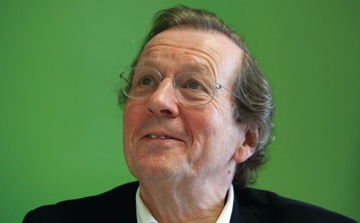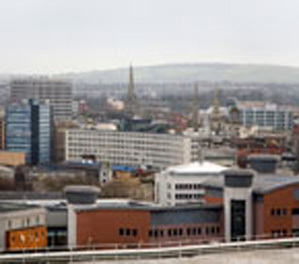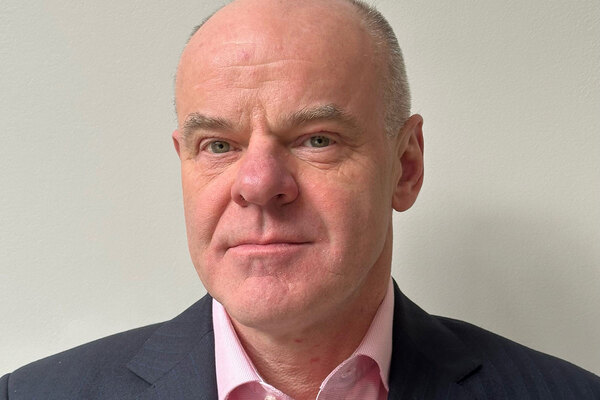You are viewing 1 of your 1 free articles
Bristol mayor shares dreams of homes
George Ferguson wants Bristol to build homes - not houses. Jess McCabe finds out about his ambitious plans to deliver developments with a soul
George Ferguson, the first elected mayor of Bristol, is famous for his red trousers.
Today the mayor doesn’t disappoint, welcoming Inside Housing into his bright green office in City Hall wearing crimson jeans. His press officer confirms that Mr Ferguson’s lower half is never seen clothed in any other colour. Such is his obsession, he registered a version of the Ferguson family tartan featuring only red threads in order to have a pair suitable for meeting the Queen and accepting his CBE for services to architecture in 2010. At funerals, he sports a formal burgundy pair.
Beneath the surface
He once told the Bristol Post that he started wearing them about 25 years ago in order to express his independence and differentiate himself from the suit-wearing, ex-city types. It is undeniable that his trousers make him stand out. But when combined with a crisp white shirt and a blazer - not to mention an accent that recalls a 1930s BBC Radio 4 presenter - the resulting feel is no less well-to-do than pin-striped perfection. His look has also helped spawn a parody Twitter account, @RedPantsMayor, which pokes gentle fun at his approach. A typical missive, after he spent a night sleeping on the street to raise awareness of homelessness on 1 March, reading: ‘After the charity sleep-out for the homeless I returned to my penthouse lair to plan a wacky pop-up night time art venue for them to enjoy’. But in the mayor’s case, these colourful first impressions conceal a seriously committed approach to tackling the city’s housing problems.
A former architect, Mr Ferguson plans to use his powers as elected mayor to overhaul Bristol’s poor house building record, setting a target of completing 2,500 affordable homes by 2018 - the exact tenure has not been decided yet, but it will be a mix, the council says. If achieved, this will be a remarkable turnaround for a city which only expects to build 103 homes this year, despite facing a mounting waiting list of 14,500; a rise in rough sleeping from nine people in 2012 to 41 in 2014 - based on a more thorough single-night count which involved checking hot spots where homeless people are known to visit - and a rapidly growing population of 428,000.
But his housing ambitions are not limited to new build. Mr Ferguson has already kicked off a £92 million energy efficiency programme to retrofit thousands of the council’s stock, and blanketing the city’s social homes in solar panels.
So, half way through his first term - which runs from November 2012 to May 2016 - is the mayor delivering on his housing goals? Or is he all mouth and red trousers?
The roots of 67-year-old Mr Ferguson’s interest in housing runs deep. A military child, Mr Ferguson travelled constantly, and boarded at a private boy’s school in Berkshire. ‘We lived all over the place, in this country and abroad. I always took an interest in places. When it came to thinking what I wanted to do, I thought there was nothing better to do than making buildings,’ he recalls. And so he came to Bristol in 1965 to study architecture, and, one year in London aside, never left.
Homebody
This wandering childhood left Mr Ferguson with not just an interest in construction, but it seems an abiding desire to settle down. Indeed, Bristol’s housing chiefs report their mayor doesn’t like to use the word ‘housing’, instead preferring the term ‘homes’.
‘Almost in my first year [of university], I felt I was making this my home,’ he reminiscences. Mr Ferguson bought a house in the centre of Bristol before he even graduated. ‘My first practical experience was to buy a house for a few hundred pounds, with a deposit paid for by a patent on a pub game which I had invented, and £5 a week from a couple of other students living with me. We turned it into a practical project in home building, while a student, in the centre of Bristol.’

Source: Rebecca Harley
Since then, Mr Ferguson has seen the city become far less affordable - the average house price in the city was £208,000 as of December, according to local estate agents, and up 39 per cent in the last decade. ‘And that is one of the things that drives me, to narrow that division between the relatively prosperous and the relatively poor.’
In his early 20s, he made a brief entry into local politics for the first time as a Liberal councillor (the Liberal Democrats didn’t exist yet). Mr Ferguson says he was drawn into politics by ‘an opportunity to change things, particularly in the planning field, which I had strong feelings about’. He stood down in 1979, ‘cancelled the local paper and just got on with running my practice’. In that year he established Ferguson Mann Architects and got to work. But this wasn’t the end of the story - Mr Ferguson stood for parliament in 1983 and 1987 as a Liberal Democrat, but didn’t win and eventually disappeared from political life.
In the intervening years, Mr Ferguson’s practice was responsible for a whole series of projects that shaped Bristol, most famously buying the city’s Tobacco Factory in 1994, and transforming it into an exemplar mixed-use regeneration project, boasting a theatre, restaurant and apartments - the mayor still lives there.
In 2003, he was elected as president of Royal Institute of British Architects, where he championed ‘making places rather than just making buildings’ until 2005. Fast forward to 2011, and Mr Ferguson found himself at the centre of the campaign for Bristol to have an elected mayor. ‘I had extracted myself from politics completely and very intentionally, and tried to do change in other ways,’ he recalls. ‘When the referendum was announced for having mayors in cities, I felt well this is a really good way to change a city - not for me to be mayor.’
House and home
Encouraged to stand during this campaign, Mr Ferguson says he in part came forward to provide a ‘relatively dogma-free’ independent candidate - that red trouser streak again.
Mr Ferguson came to power with a 6,000 margin over the nearest contender. His manifesto didn’t mention housing, but since coming into office it has become one of his biggest commitments. And he has convinced many of the city’s social landlords. Oona Goldsworthy, chief executive of 1,800-home United Communities, enthuses: ‘I feel he does love Bristol. I think he has a political ambition that is doing the best for Bristol.’ She recalls that right from the beginning, the mayor met with housing associations and showed a commitment to address a housing supply problem that Ms Goldsworthy brands ‘really, really bad’.
Mr Ferguson acknowledges that his commitment - which works out at about 900 affordable homes a year by 2018 - is lower than the number of homes Bristol needs. ‘To really catch up we should be providing between 1,000 and 1,500 new affordable homes a year,’ he says. ‘Well, I’ve got a starting base of just double figures - less than 100 affordable homes a year. It’s an appalling situation. It’s gone down and down over the years.’
There are a few reasons, he explains: Bristol, closely surrounded by other unitary authorities, doesn’t have lots of open space within city limits ready to be developed.
Mr Ferguson is by no means an advocate of just shoving up as many homes as possible at the cheapest price. ‘There is a terrible trap there if you chase numbers for the sake of it. You’ve got to make quite sure that you’re building sustainability,’ he argues. This means, he carries on, building homes that people want, in communities. ‘We’ve been very bad at that in this country, we’ve built estates,’ he pronounces the word with some hostility, ‘that are not really very attractive places to be in.’
To this end, the mayor wants housing co-operatives and self-builders to play a role in meeting the target, and to build some to the exacting Passivhaus standard of air-tight construction. Factory-built homes, which he expects to reduce costs by 10 per cent to 20 per cent, may also play a role.
A number of initiatives are already underway to transform the 2,500-home commitment into reality. In December, Bristol produced an affordable housing delivery framework which named the first council-owned sites to be brought forward for developing 1,555 new homes, of which 465 will be affordable.
Raising standards
Mr Ferguson has also set up the Bristol Homes Commission, which is due to come out with recommendations about how to catch up with housing need in May. Nick Horne, chair of the commission and chief executive of 11,000-home Knightstone Housing Association, is tight-lipped about what these will be. But he says of Mr Ferguson: ‘I was impressed by his knowledge of housing and by his passion for getting not just any old housing, for well-designed housing.’
The council itself has started building homes again in earnest for the first time since the 1980s. Consultants commissioned by the city found it has enough headroom - £2.5 million - on its housing revenue account to build 254 new homes by 2017/18, and 1,000 by 2028, and it plans to act on these findings.
Local housing associations say it is too soon to judge if all this will be enough to deliver on the mayor’s target. But 8,300-home Merlin Housing Society and 12,000-home Curo are among those already considering schemes in the city as a result of Mr Ferguson’s policies.
Mr Ferguson also wants developers to restart some of the projects which stalled in the wake of the 2008 financial crisis. Some compromises on affordable housing may be necessary. ‘They [developers] will be seeking to reduce some of the section 106 obligations,’ he says. ‘I don’t want to let people off the hook on affordable homes. But I’ve got to balance that with - it’s better to get some rather than none.’
This may be. But to be remembered as the mayor who built the homes Bristol badly needs, rather than the being the mayor who wore red trousers, some won’t be enough.
The green mayor
Bristol has won the title of European Green Capital of 2015, in recognition of its environmental commitments. This includes £47 million to install solar panels on up to 7,000 social homes, and a £45 million programme to install external wall insulation on 3,300 homes over eight years.
Bristol has managed to go ahead with the insulation project despite cuts to the energy company obligation by using its housing revenue account to help fund the project, combined with a series of European grants. ‘While we have to build new homes, we have got an absolute responsibility to make what we have got as efficient and liveable in as possible,’ the mayor says. ‘The top priority of tenants in surveys is energy efficiency and tackling energy poverty.’
George Ferguson on…
Bedroom tax evictions: ‘All our actions are based on helping rather than evicting. In the end, people will take advantage if we have a no evictions policy.’
Europe: ‘You go to places like Freiburg in Germany, where you’ve got energy efficient, family friendly, real communities that are a million miles away from the sort of estates we have traditionally produced, whether public or private.’
Standing again for Bristol mayor: ‘As long as I’m healthy I will stand again. Not because I think the whole thing is joy, because it isn’t. I think it’s right I should stand once more so I can deliver all the things I promised to deliver.’









